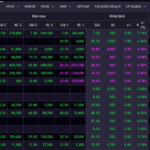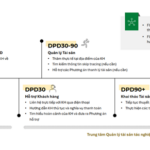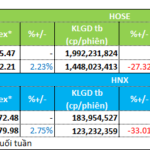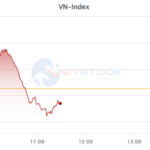Explaining this phenomenon, Ms. Hoang Viet Phuong, an expert from SSI Securities Corporation, analyzed: “Usually, in foreign countries, when the market goes down, investors will choose to buy stocks because the prices are low. On the other hand, when the market goes up and profits are assured, investors will sell to secure those profits.”
However, in Vietnam, this trend is somewhat reversed due to the herd mentality of Vietnamese investors. When stocks rise, many investors fear that prices will continue to increase, so they rush to buy, driving prices even higher and thus increasing the risk. Conversely, when the market declines, their pessimistic outlook leads them to panic sell, which further pushes the market down, resulting in significant losses.
As a result, many investors find themselves in a situation where the longer they invest, the more they lose. These investors are advised to always consider and calculate their cash flow to minimize risks.
The SSI expert also acknowledged that this year has been quite unusual for the Vietnamese stock market.
“We didn’t have any scenarios predicting such a strong stock market performance as this year. People were generally skeptical, so professional investors didn’t put much money into the market because they had been burned before and were being cautious. Only new or small investors poured money into the market. This indicates that many large investors are staying on the sidelines, so even though the market is up, not everyone is profiting enough to make up for the long periods of losses,” Ms. Phuong added.
Mr. Dang Tran Phuc, Chairman of AZfin Vietnam Securities Company, added to the analysis by stating that the stock market has been rising strongly, but the increase has been concentrated in certain groups of stocks, so not everyone is profiting. Furthermore, investing in potentially promising stocks at this point could mean buying at the peak, increasing the risk of losses.
“Moreover, in a volatile market, many investors have the psychology of only investing during strong upward trends. Unreasonable cash flow decisions and uneven market performance have led to a situation where investors are putting in a lot of money but not profiting much,” Mr. Phuc said.
Mr. Nguyen The Minh, Director of Analysis for Individual Customers at Yuanta Vietnam Securities Company, pointed out two common mistakes that investors should avoid: First is the fear of missing out (FOMO), which causes investors to disregard risks and enter the market at high-risk moments. Chasing after hot stocks with the expectation of short-term adjustments and continued growth can lead to significant risks.
History has shown that stocks that experience rapid increases in price often struggle to maintain their upward trajectory. Instead, investors should consider the profit/risk ratio, especially when risks currently outweigh the potential profits in the short term.
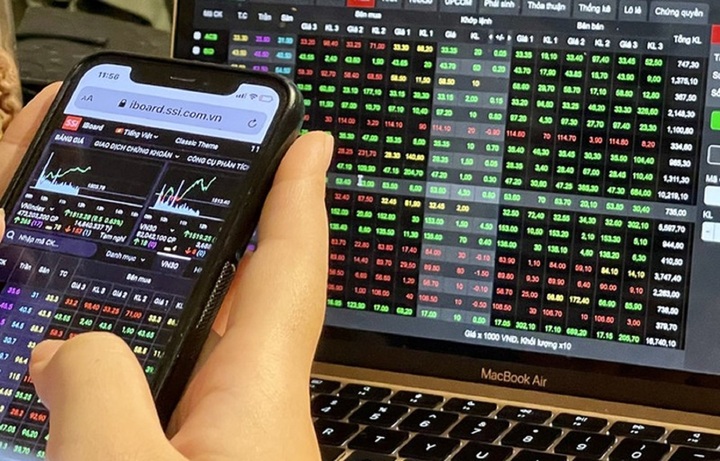
Illustration: Stock investors still struggling to “get out” despite market gains.
The second mistake is common among investors who are currently losing money, and it involves holding on to a portfolio focused on export or industrial real estate stocks from as far back as April. Their biggest mistake is the lack of flexibility in restructuring their portfolios to take advantage of the market’s upward momentum or missing out on opportunities from leading stocks due to risk aversion.
Instead of panic selling, these investors should continue holding stocks with recovery potential while avoiding FOMO when it comes to stocks that have already seen significant gains. It is advisable to wait for better discounts (price adjustments) before buying into those stocks.
Which stock groups should investors focus on towards the end of the year?
According to Mr. Phuc, whether stock investors can “get out” successfully depends entirely on their mindset and calculations.
“Vietnamese investors’ mindset hasn’t changed. They don’t buy when prices are low, but when the market is on a strong uptrend, liquidity pours in. It’s similar to investing in gold; people tend to buy when the price is high. If this continues, investors will always be on the losing end,” Mr. Phuc warned.
He also predicted that until the end of the year, banking stocks will remain attractive, and securities stocks will still be a strong speculative play. Additionally, industrial real estate stocks are performing well, but prices haven’t returned to pre-tax policy levels (referring to the tax policy announced by the US in April). Retail stocks also have the potential to explode.
Mr. Minh’s analysis suggests that the market has just gone through a strong uptrend, leading to a clear differentiation between stock groups. Some stocks have reached new highs, while others, such as export and real estate stocks, have yet to recover to their April peaks (when the VN-Index plummeted due to tax policy news). Notably, hot stocks with high margin pressure may face the risk of sharp corrections if investors sell to secure profits.
Therefore, the upcoming uptrend may not be as uniform as the previous one. Stock groups that have not risen sharply and have potential, such as banking, securities, or industrial real estate, may break out, while hot stocks may lose their appeal.
“Not all banks will rise, and not all banks are attractive for investment. While some bank stocks have been stagnant, others have continuously risen. Investors need to compare, evaluate, and analyze to make accurate choices and investments,” Mr. Minh advised.
Ms. Phuong offered a cautious outlook, stating that this year has seen many new drivers, making it difficult to predict and catch the wave.
“There are stocks that have been stagnant for 3-4 years but are now surging. Therefore, investors should observe carefully, as the market may not experience the same strong surge as in the past,” Ms. Phuong predicted.
“The Risk Management Advantage: How F88’s Unique Model Ensures Superior Asset Quality”
The business model may be easily replicated, but packaging and scaling it to establish a leading position in the modern pawnshop industry, like F88, is a challenging endeavor. The unique risk management model specific to this industry further complicates this task. How has F88 created a distinct advantage, and what has it done to achieve the lowest risk ratio ever seen?



























